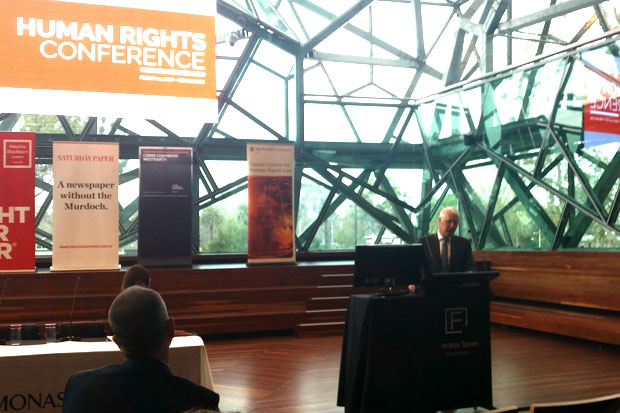Revoking alleged terrorists of their citizenship is a “symbolic gesture” and will not be effective, according to the man formerly tasked with keeping tabs on Australia’s counter terror laws.
Bret Walker SC, one of the nation’s top lawyers, has been trading barbs with the Abbott government over its plans to revoke the citizenship of dual nationals without trial, demanding an apology from the Prime Minister in June after a report he wrote was used to support the proposed laws.
Speaking at a Melbourne event today, Walker poked fun at the government and said he did not think key Liberal MP Dan Tehan understood what he was talking about.
“I do not understand what Dan Tehan means when he refers to the UK view that ministerial revocation in that country, without any need for a conviction… is a useful tool in the fight against terrorism,” Walker said.
“I’ve got no idea what it means. I don’t think he does either.”
The new laws would allow the Immigration Minister to confirm the revocation of citizenship on a range of grounds, without the need for any court approval.
Tehan is a member of the parliamentary committee that recently travelled to the UK and Europe to inspect similar counter terror measures in place there.

Aside from reiterating his opposition to the citizenship legislation, Walker also criticised laws preventing foreign fighters returning to Australia, and said the difficulty of convicting them in court was real, but should not be overstated.
“It does seem to me that we’re back to this mad idea that… rather than keep our would-be terrorists here and punish terrorists and get them back for trial, we’ve now reversed that and we’re going to have some perverse reflection of our penal colony roots by exporting our terrorist criminals,” he said.
Walker said he had “no faith at all” in Australia’s current whistleblower protections, and criticised the bipartisan consensus in Canberra not to increase the capacity of the public to be involved in debate about national security issues.
“That is a Canberra state of mind,” he said.
Sparing no-one, Walker further hit out at the Australian media for failing to engage in substantive investigative reporting in the field. Though critical of the infamous Section 35P of the National Security Legislation passed by Labor and the Coalition last year, Walker expressed doubt it would make much of a practical difference given the media was already failing to provide solid national security coverage.
Addressing the crowd at the Castan Centre for Human Rights Law annual conference, Walker took a question from Peter Greste, the Australian journalist jailed for over 400 days in Egypt, who raised the prospect he could lose his own citizenship as a man convicted of terror offences in Egypt.
Greste’s colleagues in Egypt face judgment on terrorism charges next week, as does the Australian journalist, despite his release.
Greste said the war on terror had made the media a battleground, and that journalists had become targets in conflicts where previously they had been at risk mostly from collateral damage.
Donate To New Matilda
New Matilda is a small, independent media outlet. We survive through reader contributions, and never losing a lawsuit. If you got something from this article, giving something back helps us to continue speaking truth to power. Every little bit counts.




